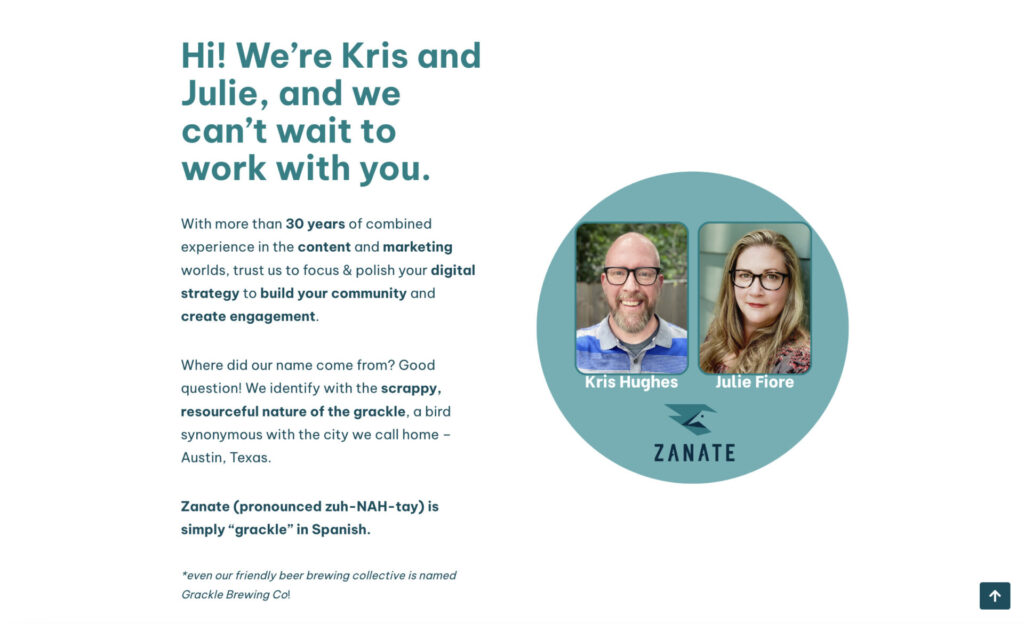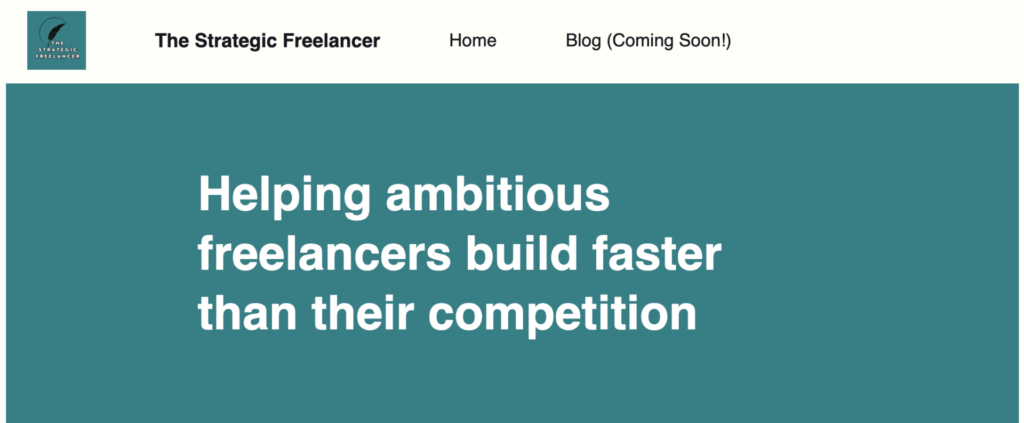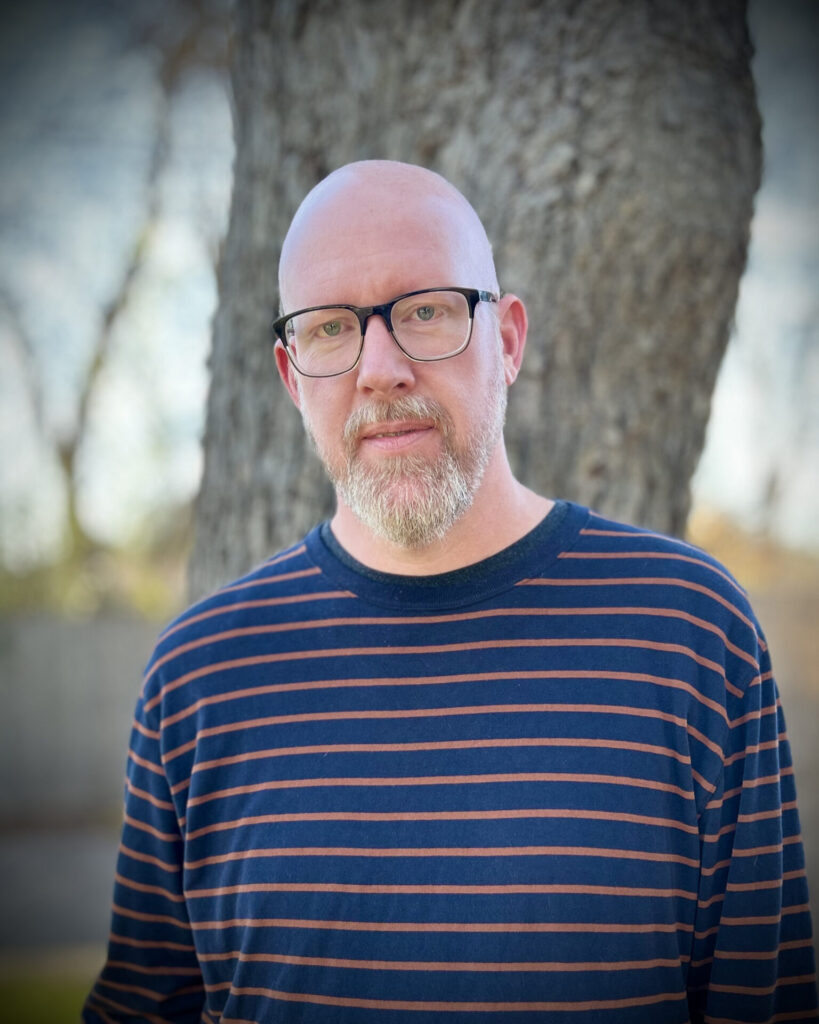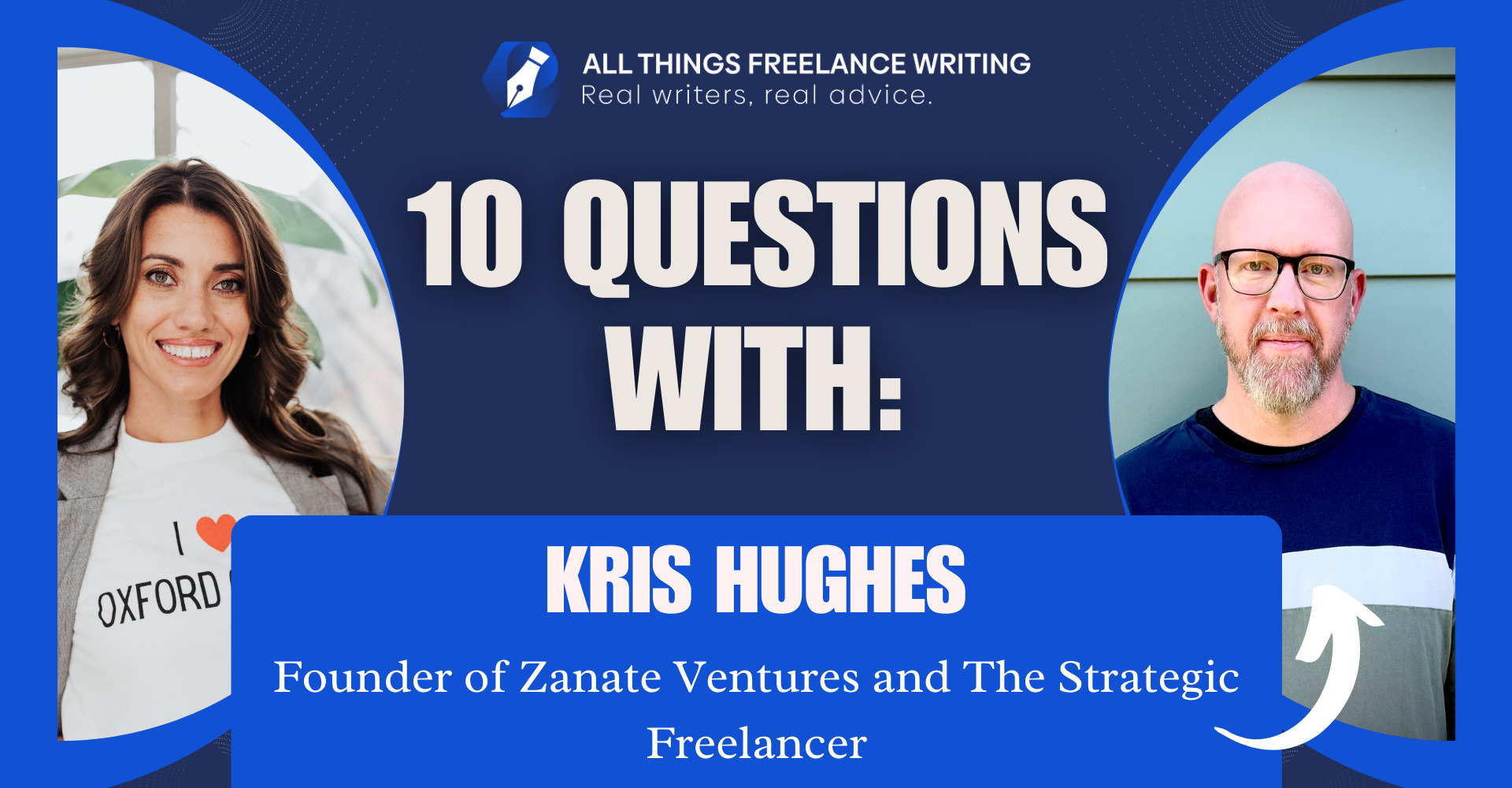Kris Hughes began working in content in 2010. Today, he and his wife run a content studio, Zanate Ventures. He also helps freelancers build businesses faster through The Strategic Freelancer.
- When did you start freelance writing? 13 years ago
- Where are you from? Amarillo, Texas
1. Hi Kris! You have a diverse background in the world of content marketing! How did you first get into it?
I earned an M.Ed. in Sports Management from the University of Texas back in 2004, and I fully intended to build a career in the professional sports world. I worked in pro sports for a few years in scouting, sales, and marketing but the combination of low pay and long hours made me realize pretty quickly it wasn’t something I wanted to do long-term. The industry certainly isn’t as glamorous as it seems from the outside looking in.
I started my own sports blogs back in 2010 as a way to learn about content development and marketing, while also working a day job in the healthcare world to pay the bills. By 2014, I had my first full-time role in content.
2. And what all do you do/offer today?
My primary role is as the Founder of our content studio, Zanate Ventures, a company that I share with my wife, Julie. We do a variety of work for our clients including LinkedIn ghostwriting, email marketing, blog content creation, thought leadership, fractional editorial work, and content operations consulting. We work with a total of 8 clients across industries as diverse as precision navigation, e-commerce, executive coaching, and marketing agencies.

My new project is building around a concept called The Strategic Freelancer. I’ve kicked things off with a few free webinars over the past few months helping freelancers move past some of the major pain points that I’ve experienced in my last 13 years in the industry – including the last 4 running Zanate.

I’m extending things in 2024 with a newsletter (Edition 1 on January 11), and offering some group coaching cohorts, 1:1 coaching, and other possibilities for people who want to move faster and take their freelancing businesses to the next level, faster.
3. Next, if you don’t mind, let’s dig into your content marketing past a bit. You developed 5 separate sports blogs from scratch and then sold them to a company that brought you on board. Do you still build sites from the ground up today with the intent to sell them, and do you think that’s a worthwhile revenue stream for writers to pursue?
It isn’t something I’ve done since that initial experience of selling the blogs I created and then taking on a bigger role with that media network, but it’s something I’d continue doing again someday as an experiment.
The primary reason I haven’t considered it is the ‘content game’ has changed dramatically since that experience back in the early 2010s. Organic traffic – especially for content-driven networks whose primary revenue stream is advertising money – is much, much harder to come by than it used to be.
I largely built my traffic base of those sites from easy organic traffic on Facebook and a little bit of SEO, and that’s a very different game now. It’s certainly not impossible, but much more volatile, and not something I’d be interested in as a focus again anytime soon – except for possibly as a side project down the road.
“Organic traffic – especially for content-driven networks whose primary revenue stream is advertising money – is much, much harder to come by than it used to be. “
Kris Hughes
4. In a past role, you also strategically used content partnerships to drive millions of traffic visits per month. Can you share how you went about that?
From 2014-2018 I was the Director of Content Operations for a digital publisher in Austin called Wide Open Media Group. Our primary niche was the ‘heartland consumer,’ and our website verticals focused on topics like hunting, fishing, country music, Southern cooking, offroading, and similar topics.
One of my primary charges was to build a traffic network for our websites on Facebook. To do this, I cold approached large community pages in our niches and offered them different types of rates to share our sites’ articles on their pages to drive us traffic. Sometimes this was paying a flat amount for every 1,000 clicks, or in some instances a flat fee per month to be able to share our articles on their pages.
The best of these relationships were successful because the page owner received relevant content from us to share consistently and also earned money for that, and we received relatively cheap traffic given what that traffic earned us from an advertising revenue perspective.
Again, this was at the peak of Facebook’s organic traffic – which fell straight off the table in 2019 – and the network I built drove 65% of the traffic to our sites by 2017. This same process would likely be possible for website owners now, but I imagine the rates you would pay and the structures you would need to work within would be different.
5. Thanks for sharing a peek behind the scenes of some of your past marketing successes. Now let’s shift gears. With your wealth of experience building and managing large teams of writers, have you noticed any key traits writers exhibit that hint to you that they’ll be great long-term partners?
There are two traits that stand out: coachability and a willingness to communicate. I’ve worked with some very talented writers who are terrible communicators, and others who write well but aren’t willing to take constructive criticism and apply that criticism to improve.
On the flipside, some of the most talented writers I’ve ever worked with have a deep desire to improve which is grounded in a willingness to ask questions, to learn, to take criticism, to communicate, and to apply it all to their work to improve incrementally.
As people get more disconnected from one another due to social media and our collective addiction to ‘all things online,’ you really stand out as a freelancer when you can communicate well and apply what you learn to continuously improve.
“There are two traits that stand out in freelance writers: coachability and a willingness to communicate.”
Kris Hughes
6. And if someone wants to build a team of writers to scale up the traffic and profitability of a site, what are 3 big mistakes should they avoid?
1. Don’t pull all of your eggs in one basket traffic-wise. Don’t depend solely on SEO, or social media referral traffic, or ads. Maintain a good mixture between a variety of tactics to keep a healthy balance, and DO NOT spend more on those tactics than you have coming in the door through your revenue sources or you’ll start sliding sideways very quickly.
2. Don’t hire more writers than you need. Take it slow. Hire one and make sure they’re always busy before you hire another, etc. It’ll be tempting to build a big team out of the gate, but that’s a path to frustration for everyone involved.
3. Be careful about the ad networks you choose to partner with. While there are some ad networks that will partner with sites as low as 10K monthly unique visitors, the ads they serve to your audience probably won’t be applicable, and in some cases could even be offensive. While it’ll be tempting to build some of these partnerships when they’re available, wait until you have a large enough traffic base to partner with the more reputable exchanges, and don’t fall prey to the temptation of the quick cash.
7. With experience driving results across various social media platforms, what advice do you have for a freelance writer looking to build their personal brand on social in 2024?

There are a few things here to consider, but the most important in my opinion is that there is no one right way to build your brand. To be blunt, anyone who tells you that there is, is likely trying to sell you something!
Over the years I’ve seen people do it in every way possible – and every channel possible. Ultimately, it comes down to what works best for you, and your situation. It’s most important to find two things and stick with them: your conviction and your definition of consistency. Conviction meaning what you feel most passionately about in your niche. What do you completely agree with? What do you completely disagree with? What’s seen as ‘common knowledge’ in your niche that you can’t understand why? Lean into that in your content.
Also, consistency can mean whatever you want it to mean. If it means posting once a week great. Three to five times a week – even better. Maybe it’s just commenting on other people’s posts to get comfortable before you start creating your own content. Consistency can have different definitions, don’t let anyone enforce what yours is — but that said when you define it, do everything you can to stick with it. The people who succeed in building a brand long-term are most often those who simply don’t quit too soon.
“[On building a personal brand] It’s most important to find two things and stick with them: your conviction and your definition of consistency.”
Kris Hughes
8. After working on pretty much every possible digital marketing channel, do you have a favorite? If so which one and why?
Definitely LinkedIn. I’ve experimented some with them all, and the only others I’d consider going back to at some point would be YouTube and TikTok. I developed some ok traction on TikTok in the B2B community when that was more of my focus as I was building the studio, but found it to be really labor-intensive to stay consistent, build community, etc.
I’ve built the backbone of the various versions of our business since early 2020 on LinkedIn. 100% of our organic leads have come from there, and we haven’t spent a dollar on advertising. The engagement comes and goes, but if you’ve done the work to build community it almost always pays off for you.
If my new focus on The Strategic Freelancer shows some dividends in 2024 and brings what I hope it will to the business, I’ll likely turn my attention back to experimenting with at least one more platform, or potentially do some paid ads to see how that goes.
“100% of our organic leads have come from LinkedIn, and we haven’t spent a dollar on advertising. The engagement comes and goes, but if you’ve done the work to build community it almost always pays off for you.“
Kris Hughes
9. When you’re not working online, what do you like to do?
I’m a massive soccer fan. I’ve been to just about every Austin FC home game since the team’s inaugural season in 2021 and plan on that going forward – along with Julie, she loves it, too! Along those lines, I follow Liverpool closely in the Premier League as well and typically will be watching them with a cup of coffee in hand on Saturday or Sunday mornings.
I love taking long walks around Austin and exploring the city. As it continues to grow there’s always something interesting to happen upon — a new coffee shop to try, a new bar to duck into, a new trailer, or hole in the wall to grab a bite to eat — whatever it may be.
I’ve homebrewed beer for over a decade and look forward to getting back into that some in ‘24. It’s a great creative outlet and a way to get away from the grind now and then and focus on creating something that isn’t content and marketing.
10. Lastly, what are you planning for 2024? What should we should keep an eye out for?
I’ll still be working full steam ahead for our current clients under Zanate Ventures – and potentially take on another 1-2 if it makes sense – but will also be spending a fair amount of attention on building in and around The Strategic Freelancer. The weekly newsletter launches on January 11th, as well as some offers around small group coaching and community which I hope to launch in Q1 or early Q2 at the latest.
From there we’ll see how the year goes, but one promise I’m making to myself is to take more time off in ‘24 to maintain some balance in my life.
Where can people find you, follow you, contact you, etc.?
The two best places are on LinkedIn and The Strategic Freelancer website!
Thank you so much, Kris, for sharing your story and wisdom with the ATFW community!


